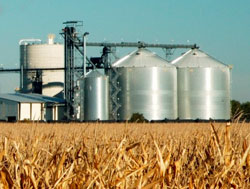 Leading experts in the field of lifecycle greenhouse gas (GHG) analysis and agricultural land use today responded to claims that corn ethanol and other biofuels are somehow worse for the climate than petroleum.
Leading experts in the field of lifecycle greenhouse gas (GHG) analysis and agricultural land use today responded to claims that corn ethanol and other biofuels are somehow worse for the climate than petroleum.
A panel of scientists and economists refuted the suggestion by anti-biofuel advocates that carbon accounting schemes should not credit bioenergy feedstocks for CO2 absorption based on the notion that the feedstock would have absorbed CO2 even if it wasn’t being used for biofuel. Renewable Fuels Association (RFA) Senior Vice President Geoff Cooper, who moderated the panel, called the assertion “illogical” and said “it’s a bit like saying the wind was going to blow anyway, so wind energy shouldn’t be counted as carbon neutral; or the sun was going to shine anyway, so we shouldn’t assume that solar panels are harnessing ‘free’ energy from the sun.”
California-based Life Cycle Associates (LCA) just released a new report on how biofuels have helped reduce GHG emissions in the United States since 2008 under the Renewable Fuel Standard (RFS2). “The lifecycle approach is the best metric for greenhouse gas emissions for biofuels because it takes into account the fact that this is short cycle carbon that was recently removed from the air,” said LCA Senior Partner Stefan Unnasch. “The alternative system means that you have to have global accounting of all agriculture… that’s simply impossible and the opportunities for fraud are present everywhere.” Even if such a carbon flow approach was possible, if done correctly it would show that bioenergy reduces GHG emissions compared to petroleum.
LCA scientist Susan Boland explains that their recent study actually found greater GHG emissions reductions from biofuels than expected. “We found that the RFS2 has resulted in significant GHG reductions, with cumulative CO2 savings of 353 million metric tonnes over the period of implementation. These emissions savings occurred even though cellulosic biofuels have not met the RFS2 production targets,” said Boland.
University of Illinois-Chicago economist Steffen Mueller noted that much is made about land going into biofuels production. “But that land area is really relatively small,” he said. “There’s a lot of other land available that we can use to optimize sequestration potential.” Commenting on the latest Department of Energy analysis, Mueller said “…ethanol produced from corn grain and corn stover provides substantial greenhouse gas benefits over gasoline.” The latest version of GREET shows life cycle emissions for corn ethanol in the range of 63.5‒66.4 gCO2e/MJ, which is over 30% less than the 94 gCO2e/MJ for gasoline.
Meanwhile, Purdue University economist Dr. Wally Tyner takes issue with the assumption land used for biofuel feedstock production would have grown the same feedstock for some other purpose or reverted to a natural state in the absence of biofuels demand. “If we hadn’t have had biofuels in the United States, we might still be paying farmers not to grow as we were before biofuels came along,” said Tyner. “So the assumption that all of this would have happened anyway I think is absurd.”
Listen to the call here: RFA GHG conference call

